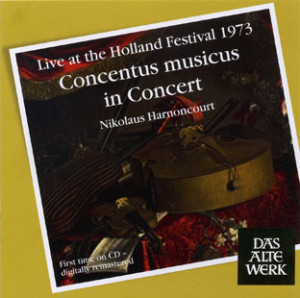What a thrill it must have been to attend this 1973 Concentus musicus concert, and after many LP incarnations, what a joy it is to finally have the recording of it available on CD. Back then, when nearly all of today’s period-instrument ensembles were either vague imaginings in the minds of hip conservatory students or were in early infancy, Nikolaus Harnoncourt and the Concentus musicus had at that point already marked 20 years of experience, and their stylistic and interpretive vision remained influential decades later.
Take for instance their performance of Antonio Vivaldi’s Concerto in G “La Notte” and compare it with the controversial 1991 recording (Teldec as well) by Il Giardino Armonico (formed in 1985). While the later group’s attack and delineation is slightly more severe, both ensembles play up the contrast of Vivaldi’s widely varied rhythmic patterns and instrumentation, achieving a practically identical dramatic conception. Likewise, the Concentus musicus’ rendering of the stately yet playful rhythmic variations in the marches and dances in its abbreviated Suite from Marin Marais’ opera Alcyone are often quite similar to Les Concert des Nations’ approach in its complete 1993 Astrée recording of the Suites directed by Jordi Savall. (Savall is one of Harnoncourt’s few peers; he began his research in the late 1950s and formed his earliest ensemble, Hesperion XX, in 1974.)
Equally engaging performances of works by Handel and Rameau are also included, yet for the finale Harnoncourt chose three sonatas by Biber (whose remarkably innovative music Harnoncourt arguably can take credit for reviving). These selections from Fidicinium Sacro-Profanum, composed when Biber was at the height of his creative and virtuosic abilities, must have been a revelation to contemporary audiences, highlighted as they were by a wide variety of tempo changes, dynamic shifts, and sudden brief, often frenzied dances, all taking place in a very short period of time (the three sonatas, with their combined 17 movements, are all performed in just 18 minutes).
The sound is remarkably good; the ensemble is captured with a sense of immediacy and transparency that continues to elude many engineers recording digitally today. W. E. v. Lewinski’s original notes are reprinted in full. All in all, a very welcome reissue.
































